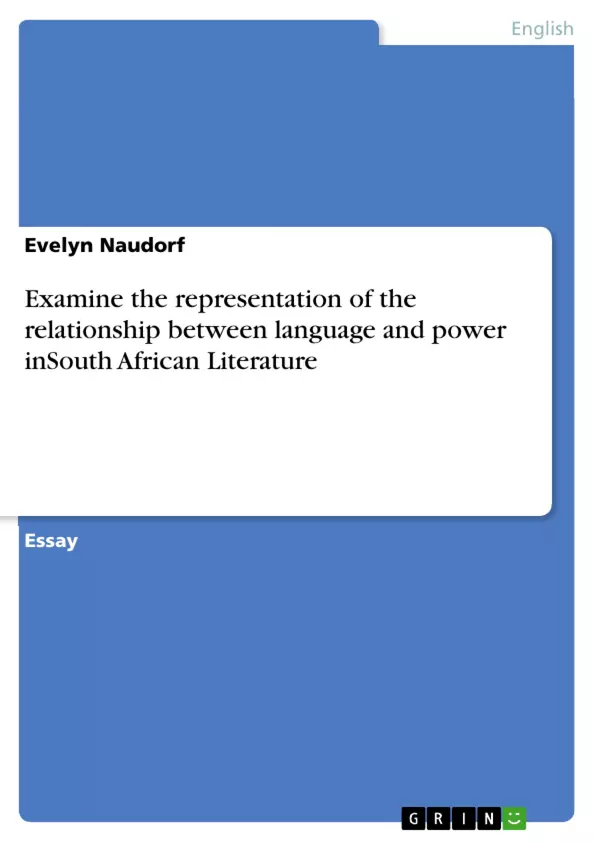‘The choice of language and the use to which language is put is central to a people’s
definition of themselves in relation to their natural and social environment, indeed in
relation to the entire universe.’1
This quote by the Kenyan writer Ngugi expresses the exceedingly important relationship
between language and the individual in general. This relationship is gaining even more
importance for a continent such as Africa, in which large parts of the native population were
oppressed by European colonial powers for centuries. One important instrument of oppression
was definitely language and the feeling of European superiority resulting out of cultural
traditions, such as literature. In South Africa, where two major colonial powers were fighting
for supremacy and many different native ethnic groups were combined in one state, the
question of language would almost naturally provoke conflicts and crisis. In this essay, I
should like to have a closer look at this delicate relationship between language and power in
South African literature with the example of a Black and a White African writer, Sol T.
Plaatje and Nadine Gordimer. In his historical overview, Leonard Thompson already describes the South Africa of the 18th
century as a ‘linguistic Babel’2. Afrikaans, a simplified form of Dutch and at first only used in
oral communication, would gradually develop into the lingua franca of South Africa. Today,
its greatest competitor among European languages is English and both languages, together
with nine African languages, belong to the eleven official languages of the postapartheid
South African State. The right of every South African to use the language of his or her choice
is now embedded in the constitution. However, the situation of having eleven official
languages is truly unique world-wide. One of the most pressing question is whether there is a
necessity to agree on a single language as the official one, with the other ten languages
receiving an equally high status, in order to support the current process of nation-building? If
so, should it be English, Afrikaans or one of the African languages? [...]
1 Ngugi wa Thiong’o. Decolonising the Mind, page 4
Inhaltsverzeichnis (Table of Contents)
- Introduction
- Language problems in South Africa
- Literature and language in South Africa
- White writing
- Black writing
- Background of authors and plot
- Sol Plaatje
- Nadine Gordimer
- Language and power in South African literature
- Mhudi
- The House Gun
- Conclusion
Zielsetzung und Themenschwerpunkte (Objectives and Key Themes)
This essay aims to explore the intricate relationship between language and power in South African literature, focusing on the works of Sol T. Plaatje and Nadine Gordimer. The essay examines how the choice and use of language reflect the socio-political realities of South Africa, particularly in the context of colonialism and apartheid.
- The significance of language in shaping cultural identity and self-definition.
- The impact of colonialism and apartheid on language use and literary expression.
- The challenges and dilemmas faced by African writers in navigating different languages and audiences.
- The influence of oral traditions on South African literature.
- The role of literature in promoting social justice and challenging oppressive structures.
Zusammenfassung der Kapitel (Chapter Summaries)
The introduction emphasizes the profound link between language and individual identity, particularly within the context of African societies impacted by colonial oppression. It highlights the significance of language in shaping cultural traditions and the complexities of language use in South Africa, a nation marked by diverse ethnic groups and colonial influences.
The second chapter examines the "linguistic Babel" of South Africa, detailing the historical development of Afrikaans and English as dominant languages alongside the nine official African languages. The chapter explores the challenges of achieving national unity through language policy, highlighting the historical use of language as an instrument of oppression and the sensitive issue of choosing a single official language.
The third chapter delves into the relationship between language and literature in South Africa. It emphasizes the dominance of English and white writers in South African literature despite the limited use of English among the broader population. The chapter then focuses on the distinctive challenges faced by Black African writers, particularly their engagement with the legacy of colonialism and the dilemma of writing in European languages while seeking to represent the voices of their communities.
Schlüsselwörter (Keywords)
This essay explores the intersection of language, power, and identity in South African literature. It examines the legacy of colonialism and apartheid, focusing on the works of Sol T. Plaatje and Nadine Gordimer. Key themes include language as an instrument of oppression and resistance, the challenges of linguistic diversity, the relationship between oral and written traditions, and the role of literature in shaping cultural narratives and promoting social justice.
Frequently Asked Questions
How was language used as an instrument of oppression in South Africa?
Colonial powers used European languages and literature to assert cultural superiority and control over the native population.
Which authors are compared in this essay regarding language and power?
The essay examines the works of Black African writer Sol T. Plaatje and White African writer Nadine Gordimer.
What does the term "linguistic Babel" refer to in the South African context?
It refers to the 18th-century situation where numerous native ethnic groups and two major colonial powers created a complex mix of languages.
How many official languages does post-apartheid South Africa have?
There are eleven official languages, including English, Afrikaans, and nine African languages, all protected by the constitution.
What is the central dilemma for African writers mentioned in the essay?
The challenge of writing in European languages while trying to represent their own cultural identity and community voices.
- Quote paper
- Evelyn Naudorf (Author), 2001, Examine the representation of the relationship between language and power inSouth African Literature, Munich, GRIN Verlag, https://www.grin.com/document/13452



